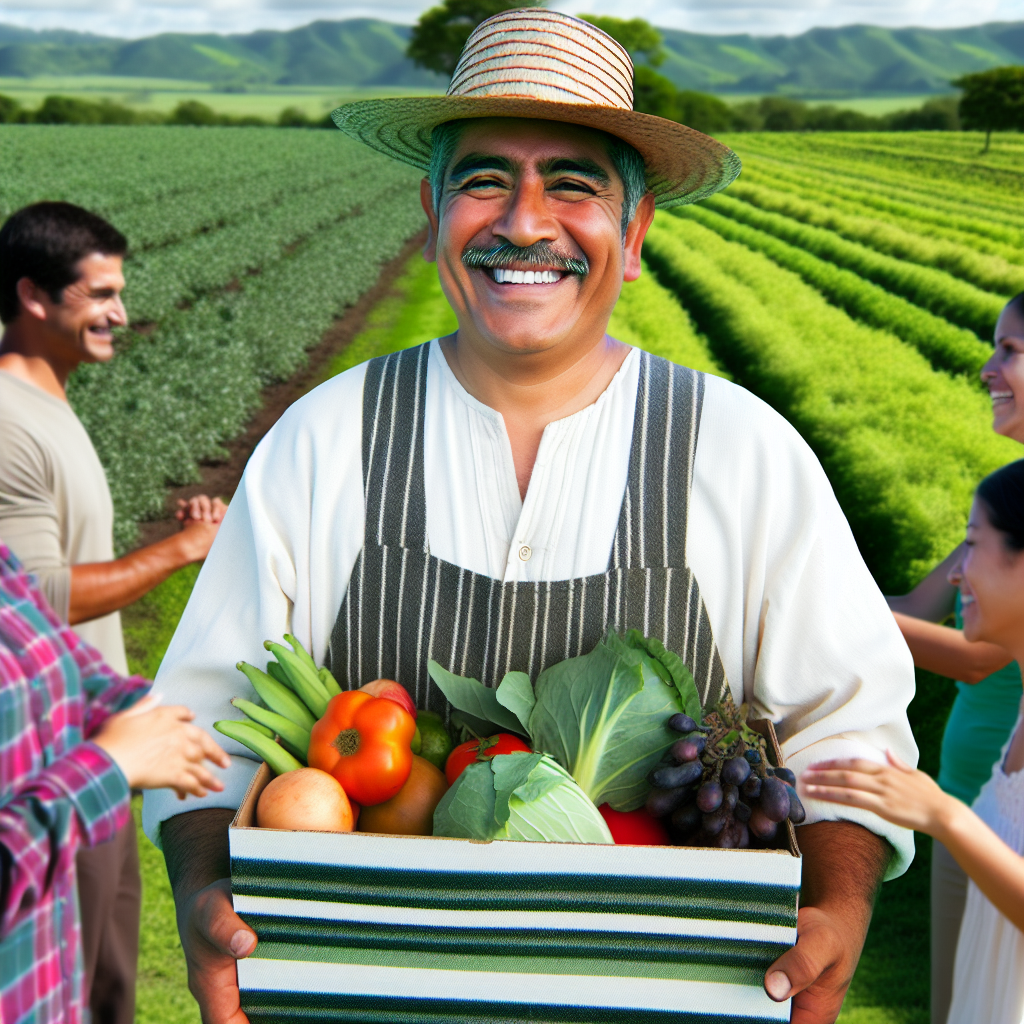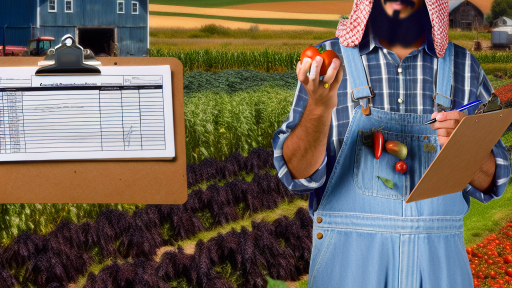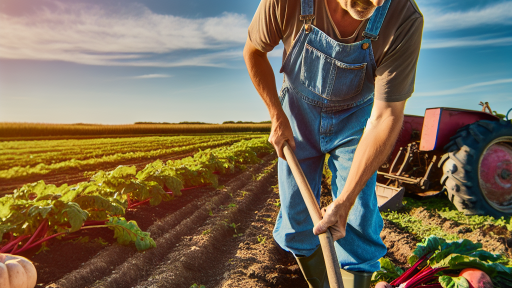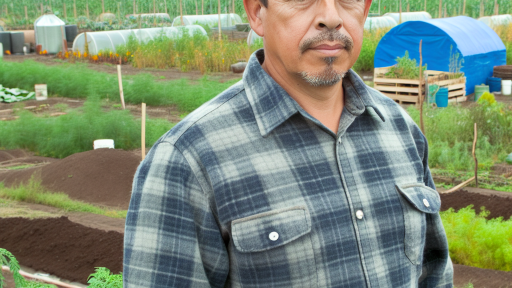Understanding Community Supported Agriculture
Community Supported Agriculture, or CSA, connects consumers with local farms.
This model supports farmers by providing upfront financial assistance.
In return, consumers receive fresh produce and farm products.
Farmers gain stability through guaranteed sales at the start of the season.
Moreover, CSAs encourage community involvement in local agriculture.
How CSAs Work
Consumers purchase shares in the farm’s harvest before the growing season begins.
This upfront investment helps cover farm operating costs.
As a result, farmers can focus on growing high-quality produce.
Throughout the season, members receive regular deliveries of fresh food.
Benefits for Farmers
CSAs provide financial security by ensuring stable income early in the season.
This reduces financial stress, allowing farmers to plan effectively.
Additionally, farmers cultivate a loyal customer base through CSAs.
These relationships foster trust and appreciation for local agriculture.
Furthermore, CSAs allow farmers to experiment with different crops.
They can share unique produce with consumers who are eager to try new things.
Transform Your Agribusiness
Unlock your farm's potential with expert advice tailored to your needs. Get actionable steps that drive real results.
Get StartedCommunity and Environmental Impact
CSAs create strong community ties between farmers and consumers.
Consumers often partake in farm activities, enhancing their connection to food sources.
Moreover, CSA farms typically utilize sustainable practices.
This approach benefits the environment by promoting biodiversity and soil health.
Stable Income for Farmers Through Upfront Membership Fees
Predictable Cash Flow
Community Supported Agriculture (CSA) provides farmers with predictable cash flow.
Farmers receive upfront membership fees from shareholders at the beginning of each season.
This system allows farmers to plan their budgets effectively.
They can purchase seeds and supplies with confidence.
Additionally, this financial boost helps stabilize their operations.
Reduced Financial Risk
Upfront payments significantly reduce financial risk for farmers.
Unlike traditional sales, farmers are compensated before producing their crops.
This insulates them from potential crop failures or market fluctuations.
Moreover, it allows them to focus on quality production rather than profits.
As a result, they can invest more resources in their farms.
Strengthened Relationships with Customers
CSAs foster stronger relationships between farmers and consumers.
Farmers engage directly with their subscribers through newsletters and farm visits.
This connection enhances customer loyalty and trust.
Cultivating these relationships leads to better customer retention.
They are more likely to renew their memberships each season.
Flexibility in Crop Planning
CSAs offer farmers greater flexibility in crop planning.
With guaranteed income, they can experiment with new crops and techniques.
This experimentation can lead to diversified farm income.
Farmers can respond better to consumer preferences and trends.
Consequently, they can enhance their marketability and resilience.
Showcase Your Farming Business
Publish your professional farming services profile on our blog for a one-time fee of $200 and reach a dedicated audience of farmers and agribusiness owners.
Publish Your ProfileReduced Marketing and Distribution Costs for Farmers
Direct Sales to Consumers
Community Supported Agriculture (CSA) enables farmers to sell directly to consumers.
This approach eliminates middlemen, reducing overall marketing costs.
Farmers retain a larger share of consumer spending.
Consequently, income stability improves for local farms.
Lower Transportation Expenses
By participating in CSAs, farmers minimize transportation costs significantly.
Delivery routes become shorter and more efficient.
Farmers can focus on local distribution rather than expansive shipping networks.
As a result, they save time and fuel expenses.
Streamlined Packaging
CSAs often require less complex packaging than traditional retail.
Farmers can use simple, environmentally friendly materials.
This reduces costs associated with packaging supplies.
Additionally, simpler packaging aids in quicker packing processes.
Enhanced Customer Loyalty
Farmers build consistent relationships with community members through CSAs.
As trust grows, customers are more likely to return each season.
Repeat business lessens the need for advertising.
Therefore, marketing costs continue to decline.
Time Savings in Marketing Efforts
Farmers benefit from decreased time spent on traditional marketing efforts.
They can focus their efforts on crop production instead.
Using CSA platforms for communication reduces the need for extensive promotions.
Farmers can spend more time tending to their crops and less on marketing.
Learn More: Enhancing Farm Visits with Agri-Tourism Activities
Direct Relationship Between Farmers and Consumers Enhancing Trust
A direct relationship fosters strong connections between farmers and consumers.
This connection enhances trust in local agriculture.
By participating in Community Supported Agriculture (CSA), consumers directly support local farmers.
Farmers benefit from regular payments throughout the growing season.
Consumers gain fresh, seasonal produce from reliable sources.
Transparent Communication
Transparency is key to building trust in the farming community.
Farmers openly share their growing practices with consumers.
This openness allows consumers to understand the processes behind their food.
Consistent communication strengthens the bond between both parties.
Shared Responsibilities
Community Supported Agriculture encourages shared responsibilities.
Consumers often help with farm activities, creating a sense of ownership.
This involvement fosters deeper relationships among members and farmers.
As a result, everyone feels a mutual commitment to the farm’s success.
Accountability and Support
A strong relationship cultivates accountability between farmers and consumers.
Farmers feel motivated to deliver quality products consistently.
Consumers support their farmers by providing feedback and encouragement.
This dynamic enhances everyone’s experience and investment in the community.
Long-term Partnerships
Over time, CSAs develop lasting partnerships between farmers and consumers.
These partnerships increase loyalty to local agricultural practices.
Showcase Your Farming Business
Publish your professional farming services profile on our blog for a one-time fee of $200 and reach a dedicated audience of farmers and agribusiness owners.
Publish Your ProfileFarmers serve as trusted sources of food for their communities.
By nurturing these relationships, they create a healthy local ecosystem.
Uncover the Details: Managing Inventory for Direct-to-Consumer Farms
Opportunities for Farmers to Diversify Crops Based on Consumer Preferences
Adapting to Market Trends
Farmers can capitalize on changing consumer tastes effectively.
Market research helps identify popular crops among local consumers.
Seasonal trends also guide farmers in selecting thriving crops.
Regularly updating offerings keeps the produce fresh and appealing.
Engaging with Community Supported Agriculture
Community Supported Agriculture (CSA) fosters strong farmer-consumer relationships.
Farmers gain insights into consumer preferences directly through subscriptions.
This feedback loop allows farmers to adapt their crop choices accordingly.
As a result, they reduce waste and improve sales efficiency.
Financial Benefits of Crop Diversification
Diverse crops can lead to increased revenue streams for farmers.
Specialty crops often yield higher prices in local markets.
Farmers benefit financially by tapping into niche markets.
Additionally, diversification reduces risks associated with crop failure.
Improving Soil Health and Sustainability
Crop rotation patterns contribute to healthier soil fertility.
Diverse crops enhance ecosystem resilience on the farm.
Farmers can restore nutrients through varied planting practices.
Consequently, sustainable farming practices attract environmentally conscious consumers.
Building Community Connection
Offering a variety of crops can strengthen community bonds.
Farmers engage local customers by providing fresh, diverse produce.
Community-driven initiatives promote shared values around food.
As a result, customers feel more connected to their food sources.
Delve into the Subject: Effective Crop Rotation Strategies for Small Farms

Increased Access to Local Food Markets and Community Engagement
Strengthening Local Economies
Community Supported Agriculture (CSA) models empower farmers financially.
They provide upfront payments for the season’s harvest.
This model reduces financial uncertainty for farmers.
Consequently, it fosters economic stability in local communities.
Through local sales, farmers keep more revenue within the community.
Building Direct Relationships
CSAs enable farmers to connect directly with consumers.
These relationships build trust and transparency in food sourcing.
Farmers can receive direct feedback on their products.
This communication encourages improvements and innovation.
Enhancing Community Engagement
CSAs often include community events and activities.
This encourages members to learn about farming practices.
Events like farm tours or harvest festivals strengthen ties.
Such activities deepen the community’s understanding of agriculture.
Promoting Sustainable Practices
Farmers in CSAs often adopt sustainable agriculture methods.
Members support environmentally friendly practices through their purchases.
This shared commitment fosters community awareness of sustainability.
Showcase Your Farming Business
Publish your professional farming services profile on our blog for a one-time fee of $200 and reach a dedicated audience of farmers and agribusiness owners.
Publish Your ProfileAdditionally, it highlights the importance of local food systems.
Delve into the Subject: Top Agri-Tourism Activities for Farm Visitors
Risk-sharing Between Farmers and Consumers in Poor Harvest Seasons
The Concept of Risk-sharing
Risk-sharing plays a vital role in community-supported agriculture (CSA).
It creates a partnership between farmers and consumers.
In essence, both parties share the rewards and setbacks.
This collaboration fosters a sense of community and trust.
Benefits for Farmers
Farmers experience financial security through upfront payments.
These payments allow them to plan and invest in their crops proactively.
Even during poor harvest seasons, farmers receive stable income.
This reduces uncertainty and stress associated with fluctuating market prices.
Moreover, it enables farmers to focus on sustainable practices.
Support from Consumers
Consumers play a crucial role by committing to buy from local farms.
They understand that their support helps farmers during tough times.
In turn, they receive fresh, locally grown produce.
This relationship promotes food security within the community.
Strategies to Enhance Risk-sharing
Farmers can implement various strategies to strengthen risk-sharing.
- Establish clear communication with consumers regarding expectations.
- Develop flexible subscription models to accommodate changing circumstances.
- Engage consumers through educational workshops and farm events.
Building Resilience in Agriculture
Ultimately, risk-sharing nurtures resilience in local agriculture.
It empowers farmers to withstand adverse conditions.
At the same time, it connects consumers closely to their food sources.
This partnership is essential for building sustainable food systems.
Sustainability Benefits
Promoting Organic Farming
Community Supported Agriculture (CSA) supports organic farming through direct partnerships.
Farmers benefit from a market eager for fresh, chemical-free produce.
This model encourages sustainable practices and eliminates harmful chemicals.
Furthermore, it helps to build healthy soil and enhance biodiversity.
As a result, farmers observe improved yields and quality in their crops.
Encouraging Eco-Friendly Practices
CSAs promote eco-friendly practices that reduce the carbon footprint of food production.
Farmers adopt techniques such as crop rotation and composting.
These methods improve soil health and enhance water conservation.
Additionally, CSAs often utilize renewable energy sources, decreasing reliance on fossil fuels.
Consequently, farmers can market themselves as environmentally responsible, attracting more customers.
Building Community Connections
Through CSAs, farmers forge deeper connections with local communities.
This relationship fosters trust and loyalty among consumers.
People are more likely to support farmers whose practices they understand and respect.
Moreover, community involvement in farming encourages sustainable food systems.
Farmers also educate consumers about seasonal produce and sustainable practices.
Additional Resources
Leading the Farm to Table Movement in Greenville SC – Farm to …
Farm to Table: A look into who supports it and its significance in …




